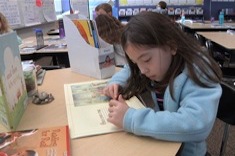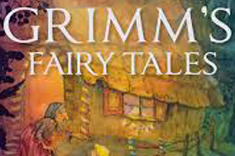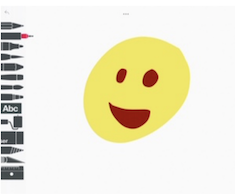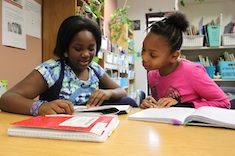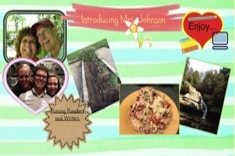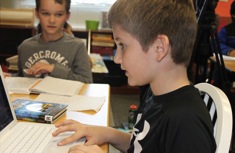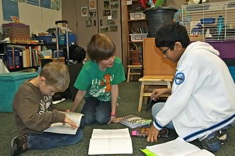Julie Johnson
Julie Johnson is a literacy coach in Hilliard, Ohio and has taught for over 20 years. She is a teacher-consultant with the National Writing Project, a recipient of the NCTE Donald Graves writing award, and is the author of the blog Raising Readers and Writers.
All Content
Reframing Writers
Julie Johnson encourages educators to take a more in-depth view when assessing student writers. Checklists don’t necessarily grow writers, but focusing on what students are doing well and nudging them forward will.
The Answer Is Always “Yes”
Julie Johnson shows how saying yes empowers students to do the work of writers: make decisions, experiment, build relationships, and be confident as a writer.
Bring In the School Year Like a Grandma
Julie Johnson reflects on how to help students know they belong and are valued in a classroom community.
Minilessons About Sound and Image
Julie Johnson encourages minilessons about sound and image to give students more ways to create meaningful texts.
Fairy Tales with a Multimodal Twist: Process and Product
In this second installment, Julie Johnson guides the process of creating multimodal fairy tales, as well as discusses producing the final product.
Fairy Tales with a Multimodal Twist: Laying the Groundwork
Julie Johnson outlines the groundwork for creating multimodal fairy tales in writing workshop.
Importance of Talk in Writing Workshop
Julie Johnson reminds us of important mindsets to adopt to allow students the space and permission to talk while composing. When students talk as writers, they have opportunities to create new understandings, build relationships, and validate each other.
The Importance of Audience
Julie Johnson demonstrates how teachers can help students think through issues of audience during writing workshops.
Conflict: A Coach’s Perspective
Julie Johnson gives a coach's perspective on conflict with a teacher and how it was resolved.
Good Intentions Gone Wrong
Julie Johnson experiences a horrible moment as a literacy coach, and realizes she needs to slow down and prioritize her time in new ways.
Choosing the Right Tool for Your Message
Julie Johnson has advice on classroom uses of tech resources.
Writer-ish
Julie Johnson fails in an attempt to assess two kindergartners, and over time learns a lot about trust and the children's abilities from observing them and listening to their teacher.
Repurposing a Classroom Library for Coaching and Intervention: Hooking Reluctant Readers in Grades 3-5
Julie Johnson moves from a teaching to a coaching and intervention position, and finds the move requires some rethinking about her library of books.
Teacher Blogs in the Digital World
Julie Johnson introduces blogging to teachers in a digital learning class, and shares “mentor blog” resources to help any teacher get started with blogging.
Inviting Teachers into the Digital World
Julie Johnson shares some practical tips for helping teachers with little tech savvy find ways into the digital world.
Keeping Kids Safe on the Internet
Julie Johnson provides helpful tips and a letter for parents to help keep students safe on the Internet.
Using Technology to Connect Young Readers and Writers
Julie Johnson reflects on how technology is changing her own reading community, and builds on this knowledge to connect readers and writers in her classroom with others through the Internet.
Teacher Vulnerability
Julie Johnson writes about renewal and staying centered during tough teaching times.
Math Journals
Julie Johnson rekindles her love affair with math when she incorporates journals and sees her students become more adept at organizing and explaining their thinking.
Family History Inquiry Project: Integrating Technology with Social Studies in First Grade
Julie Johnson explains how a family history inquiry project in her first-grade classroom built technology, literacy, and research skills as students explored many cultures.
The Nuts and Bolts of the Family Inquiry Project
Julie Johnson explains how a family history inquiry project in her first-grade classroom builds technology, literacy, and research skills as students explored many cultures. This article is the second in a two-part series.
Creating a Model Writing School
Julie Johnson shares the professional development plan and experiences that led to her school's evolution into a model writing school.
Creating a Model Writing School . . . Next Steps
Julie Johnson documents the continuing evolution of her learning community as a model writing school.
Teaching from the Heart
Teacher Educators Teach is a neighborhood in our Leaders Lounge just for teacher educators. Julie Johnson shares how she tackled the problem of engagement and discovers practical ways to make connections.
Connecting with Students at Home
Julie Johnson learns some important lessons about connecting with students remotely, and few of them are about technology.



